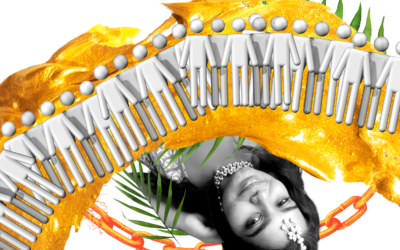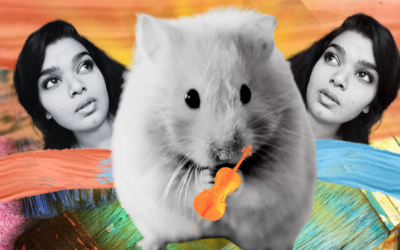The Insidiousness Of Internalized Racism
The way you speak English shapes how the world perceives you.
Utter a few sentences and a keen observer may draw conclusions about your competence, class, social status, education and professional experience. The kind of English you speak determines the doors which open for you. For instance, your English skills impact the jobs, relationships and even the medical attention you may get.
English is the language of colonialism.
Proficiency in English equals proximity to Whiteness.
When another person from the global South says to me–“Your English is perfect”– I can’t take it at face value or just smile. I hear the aspirational undertones.
As people of color, celebration of our mastery in English can feel like a rejection of ourselves. It is a sad reminder of the insidiousness of our own internalized racism.
***
“But… you don’t sound Indian. Your English is perfect!”
Beaming at me, Pahri is waiting for my response.
I’m frozen.
Teeth gritted. Awkward grin. Blank eyes. Embarrassed.
If a white person said the above to me, I’d probably feel annoyed. I might even say something passive aggressive, like: ‘Thank you. Your English is perfect too’. But this… this is different. Pahri is from Jakarta, Indonesia. When he tells me ‘I don’t sound like an Indian’ – Pahri means it in the most complimentary way.
And that’s exactly what makes my stomach churn. I feel uneasy.
I am Indian. I grew up in Dubai. English is not my mother tongue—but it is as good as. I think, dream and write in English. My education, career and deepest relationships have been in English. When I read for pleasure, education or spiritual guidance—it is in English.
Yes, I’m fluent in English. I’m not ashamed of it.
I am ashamed of benefiting from a world view which celebrates proximity to Whiteness over all else. I’m frustrated by how colonialism rewards us for being distant from our mother tongue and native cultures. I’m angered by how people from the Global South have internalized this racist preference for proficiency in a certain type of English.
*
More than an accent
The energy you feel when someone speaks is more than an accent. It is a life force. It’s an extension of a person’s lived experiences, philosophy and knowledge.
I am a writer, thinker and speaker. My vocabulary, accent, cadence and conversation are the primary way I express and assert myself. I’ve read my share of books, travelled across the world and processed my amount of inherited heartbreak.
When someone compliments the way I speak and asks me if I grew up in the West…I feel unseen. Invisible. Invalidated.
“You are so articulate” is such a painful subtle act of exclusion.
I feel a sadness that I can’t claim my intelligence without it being attributed to proximity to Whiteness.
*
“Native speakers only”
As a journalist in Dubai’s racist publishing world–I’ve cringed at many ‘native-speakers-only’ type advertisements for copyediting or journalism jobs.
‘Native Speakers Only’ is a euphemism. Basically, it means: ‘White people need only apply”.
I’ve felt white-hot fury that my resume would not be considered even though I was qualified.
No matter how skilled I am in English, how many syllables I use per word, how anglicized my accent is – I will never be a ‘native speaker’.
I’m not White.
Some doors will never open for me.
***
“You don’t even try to speak Konkani…”
My mother’s eyes are flashing red.
She is frustrated with me. The chasm is growing between my mother’s conservative ideals and my sense of individualistic feminism. She lashes out at the way I speak.
“Be humble! Be humble, Eva! Speak slowly and softly. We are not Americans. Be simple.”
Triggering, much?
I’ve heard versions of this reprimand over the years. Every time it strikes me in the heart. I feel disowned by a culture I can never fully call my own.
My parents chose NOT to speak to me in Konkani, my mother tongue, because of a belief in the world of opportunity speaking English would bring me. Because they spoke Konkani at home all the time, I understand it fairly well.
Still, my tongue stumbles over itself when I try to construct a sentence. I’m embarrassed by my own childish conjugation. Now, my mother hurls my inability to speak Konkani at me as an insult.
I’m silent.
I think about how fucked up it is that colonialism rewards us from how distant we are to our mother tongue.
***
“You have a wonderful way of speaking.”
My back is leaning against the wall of the metro cabin.
My friend is deep in conversation. As I listen, I notice a young Indian man watching me intently. His eyes stay with us the entire ride home.
Once I’ve gotten off the train, I’m not too surprised to see the Indian man catch up with me.
“Excuse me, I just wanted to say—you have a wonderful way of speaking.”
I give him a watered-down smile.
“What do you do… other than speak so well?”
He continues this strange clumsy form of flattery culminating with him asking me for my number.
As I walked home, I couldn’t help but think–isn’t it strange to start a pick-up line with a comment on my articulation? What is it? The more I consider the issue, I realize it is my proximity to Whiteness and femininity… that he finds attractive. If he hadn’t heard me speak – would he still have wanted my phone number? I don’t think so. Proximity to whiteness is so often the marker of a woman’s beauty and sexuality. The fairness of her skin, the straightness of her hair and the color of her eyes. Not having any of these traditional physical markers of ‘beauty’; I’m bristled by his compliment.
***
‘Making a problem out of nothing…
In thinking this essay through, a dear white friend asks me why I can’t just take a compliment at face value? You’re making a problem out of nothing.
The comment is kindly meant and I take no offence.
I understand the limitations of this conversation. I can’t find a compassionate response, so I keep quiet. I look out of the window. That response is fatigue. It’s exhaustion. The complexity of my identity is rarely understood, especially here in the US. I’m so exhausted of being around people who…. I don’t want to explain anymore. At the same time I don’t want to let these comments into my heart or my way of seeing myself. The title of a book pops into my mind.
The title of a book pops into my mind.
Subtle Acts of Exclusion: How to Understand, Identify, and Stop Microaggressions
*
My Hearts Understands
“Oh, Maria Pita Che. Oh, Maria Pita Che! Maria Pita Che…Yeeev-erybody….”
The beads of sweat are running down my forehead. I tighten my grasp over the moving arms of the elliptical. I’m at a YMCA in the USA – frequented by retired military men. We had ten inches of snow last night. It doesn’t get Whiter than this.
On my cell phone though – it is a different story.
Maria PitaChe! Maria PitaChe!
Flashes of tropical coconut trees pulse with the rhythms of Remo Fernandes.I feel a constriction in my throat as I am reminded of family parties.
Tall bottles of alcohol. My father dancing with a handkerchief. My uncles clucking like chickens. Konkani baila music fills the air. Remo’s singing in Goan Konkani and affected Portuguese. My mind only partially deciphers the meaning; the rest I understand with my heart.
I continue on the elliptical, moving faster, faster and faster now.
My heart is full.
My lips voicelessly mouthing Konkani stanza.
I’m not at peace with this.
Sure, I’m at peace with the way I speak and the privilege I have but I’m highly uncomfortable with systems of injustice, class discrepancies and trauma associated with Whiteness.
The truth is the complexity of having an identity means you’re forever in conversation with the forces of injustice, the lineage of racism and classism.




